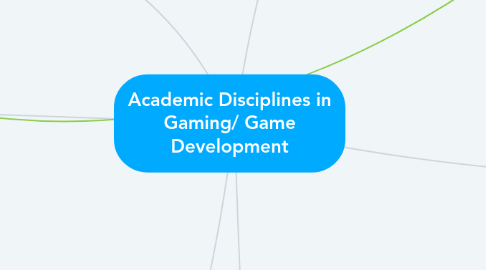
1. Arts
1.1. Visual Arts
1.1.1. Animation
1.1.2. Game Design
1.1.3. Graphic Design
1.2. Performing Arts
1.2.1. Music
1.2.1.1. Conducting
1.2.1.2. Organology
1.2.1.3. Recording
1.2.2. Animation
2. Social Sciences
2.1. Anthropology
2.1.1. Linguistic Anthropology
2.2. Economics
2.2.1. Economic Systems
2.3. Law
2.3.1. Contract Law
2.3.2. Corporations
2.4. Political Science
2.4.1. Civics
2.4.2. Geopolitics
2.5. Psychology
2.5.1. Media Psychology
2.5.2. Pedology
2.5.3. Pscychopathology
2.6. Sociology
2.6.1. Area Studies
2.6.2. Collective Behavior
2.6.3. Cultural Studies/ Ethnic Studies
2.6.4. Demography
2.6.5. Feminist Sociology
2.6.6. Gender Studies
2.6.7. Sexology
2.6.7.1. Queer Studies
3. Formal Sciences
3.1. Computer Science
3.1.1. Algorithms
3.1.1.1. Randomized Algorithms
3.1.2. Artificial Intelligence
3.1.2.1. Robotics
3.1.3. Computer Graphics
3.1.4. Computer Communications
3.1.4.1. Internet, World Wide Web
3.1.4.2. Wireless Computing
3.1.5. Data Mangaement
3.1.6. Multimedia/ Hypermedia
3.1.6.1. Sound and Music Computing
3.2. Mathematics
3.2.1. Combinatorics
3.2.1.1. Coding Theory
3.2.2. Cryptography/Cryptology
3.2.3. Game Theory
3.2.4. Graph Theory
3.2.5. Operations Research
3.2.5.1. Dynamic Programming
3.2.5.2. Scheduling
3.2.6. Statistics
3.2.6.1. Demography
3.2.6.2. Data Visualization
3.3. Statistics
4. Humanities
4.1. Geography
4.1.1. Cartography
4.1.2. Economics
4.1.3. Political Geography
4.1.4. Population Geography
4.2. History
4.2.1. Ancient History
4.2.2. Asian History
4.3. Languages and Literature
4.3.1. Linguistics
4.3.1.1. Etymology
4.3.1.2. Grammar
4.3.1.3. Lexicology
4.3.2. Creative Writing
4.3.2.1. Fiction
4.3.2.2. Non-Fiction
4.4. Philosophy
4.4.1. Ethics
4.4.1.1. Animal Rights
4.4.1.2. Bioethics
4.4.1.3. Environmental Ethics
4.4.2. Philosophical Schools and Traditions
4.4.2.1. Eastern Philosophy
4.4.3. History of Philosophy
4.4.3.1. Ancient Philosophy
4.4.3.2. Contemporary Philosophy
4.4.3.3. Modern Philosophy
4.5. Theology
4.5.1. Biblical Studies
4.5.2. Religious Studies
5. Applied Sciences
5.1. Engieering
5.1.1. Chemical Engineering
5.1.1.1. Bioengineering
5.1.1.2. Materials Engineering
5.1.1.3. Nanotechnology
5.1.1.4. Thermodynamics
5.1.2. Civil Engineering
5.1.2.1. Mining Engineering
5.1.2.2. Structural Engineering
5.1.2.3. Structural Mechanics
5.1.3. Educational Technology
5.1.3.1. Instruction Design
5.1.3.2. Knowledge Management
5.1.4. Electrical Engineering
5.1.4.1. Computer Engineering
5.1.4.2. Computer Sciences
5.1.4.3. Electronic Engineering
5.1.5. Mechanical Engineering
5.1.5.1. Aerospace Engineering
5.1.5.2. Acoustical Engineering
5.1.5.3. Automotive Engineering
5.1.5.4. Biomedical Engieering
5.1.5.5. Fluid Engineering
5.1.5.6. Nanoengineering
5.1.5.7. Optical Engineering
5.1.5.8. Robotics
5.1.5.9. Thermodynamics
5.1.5.10. Vehicle Engineering
6. Natural Sciences
6.1. Biology
6.1.1. Anatomy
6.1.2. Biotechnology
6.1.3. Evolutionary Biology
6.1.4. Genetics
6.1.4.1. Molecular Genetics
6.1.5. Parasitology
6.1.6. Virology
6.1.7. Mammalology
6.2. Chemistry
6.2.1. Biochemistry
6.2.2. Chemical Engineering
6.2.3. Nanotechnology
6.3. Earth Sciences
6.3.1. Environmental Sciences
6.3.2. Geography
6.4. Space Sciences
6.4.1. Numerical Simulations
6.4.1.1. Hydrodynamics
6.4.2. Planetary Science
6.5. Physics
6.5.1. Acoustics
6.5.2. Applied Physics
6.5.3. Cryogenics
6.5.4. Mechanics
6.5.5. Optics
6.5.6. Solid State Physics
6.5.7. Thermodynamics
6.5.8. Vehicle Dynamics

